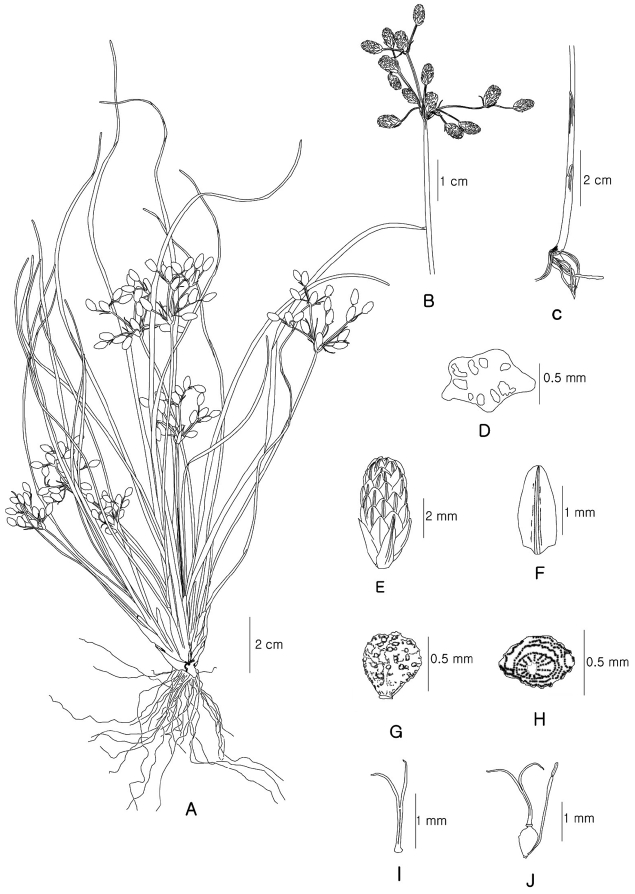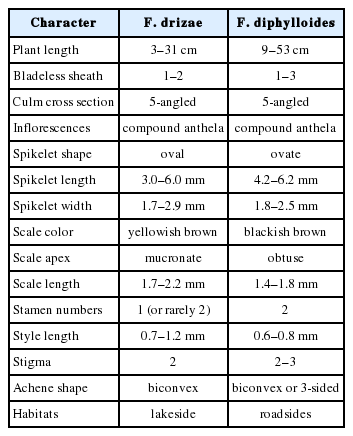하늘지기속(사초과)의 신종: 물하늘지기 (Fimbristylis drizae J. Kim & M. Kim)
A new species of Fimbristylis (Cyperaceae): F. drizae J. Kim & M. Kim
Article information
Abstract
사초과의 하늘지기속 신종인 물하늘지기(Fimbristylis drizae J. Kim & M. Kim)를 전라북도 정읍시 수청저수지에서 발견하여 기재하였다. 물하늘지기는 줄기는 5각형이고 1−2개의 기부 경생엽이 엽신이 없는 엽초만 있으며 화서는 소수화서를 가진 점에서 검정하늘지기(F. diphylloides Makino)와 유사하다. 그러나 물하늘지기는 주두가 2개이고, 소수가 타원형이며, 수술이 1개(드물게 2개)이고, 인편이 황갈색이며 저수지 가장자리에서 자라는 특징을 가지고 있다. 반면에 검정하늘지기는 주두가 2개 또는 3개이고, 소수가 난형이며, 수술이 2개이고, 인편이 흑갈색이며 임도변의 습한 곳에서 자라는 점에서 구별된다.
Trans Abstract
A new species, Fimbristylis drizae J. Kim & M. Kim, is named and described from Sucheong Lake, Jeongeup-si, Jeollabuk-do, Korea. Fimbristylis drizae shares several characters (five-angled culm, 1−2 bladeless sheath, and compound anthela inflorescence) with the related species F. diphylloides Makino. It is, however, distinct from F. diphylloides, which has two to three stigmas, ovate spikelets, two stamens, a blackish brown scale, and a roadside habitat. In contrast, the new species has two stigmas, oval spikelets, one (or rarely two) stamens, a yellowish brown scale, and a lakeside habitat.
The genus Fimbristylis Vahl (Cyperaceae) consists of approximately 200–300 species and is distributed primarily in tropic, subtropic, and temperate zones of the Northern Hemisphere (Vahl, 1805; Makino and Nemoto, 1925; Kral, 1971).
Fimbristylis is characterized by the usual presence of leaf blades, leaf sheath without long silk hairs at the apex, and achene with deciduous style base (Zhang et al., 2010; Kim and Kim, 2013). Twenty taxa of Fimbristylis are distributed in Korea (Lee, 1980; Lee, 1996; Im, 2000; Lee, 2006; Oh, 2007). Of these, F. dichotoma (L.) Vahl and F. autumnalis (L.) Roemer & Schultes occur widely, while Fimbristylis hookeriana Boeckeler and F. diphylloides Makino are rather rare, with sporadic distribution (Oh, 1991; Oh and Park, 1997; Kim and Kim, 2013).
A new species of Fimbristylis was discovered for the first time at Sucheong Lake, Jeongeup-si, Jeollabuk-do Province, Korea. The new species shares several characters with the related species, F. diphylloides Makino, but it can be distinguished based on the stigma number (2), spikelet shape (oval), stamen number (1, or rarely 2), scale color (yellowish brown), and habitat (lakeside). Thus, we named this new taxon as Fimbristylis drizae J. Kim & M. Kim.
Taxonomic Treatment
Fimbristylis drizae J. Kim & M. Kim, sp. nov. (Figs. 1–3)
TYPE: Korea. Jeollabuk-do Province, Jeongeup-si, Sucheong Lake. 28 Sep 2013. J. H. Kim 13158 (Holotype, JNU; Isotypes, JNU, KH)
Korean name: Mul-ha-neul-ji-gi 물하늘지기

Photographs of Fimbristylis drizae J. Kim & M. Kim. A. Habit; B. Inflorescence; C. Culm cross section; D. Spikelet; E. Scale; F. Achene; G. Style and stigma.

Illustrations of Fimbristylis drizae J. Kim & M. Kim. A. Habit; B. Inflorescence; C. Culm base part; D. Culm cross section; E. Spikelet; F. Scale; G. Achene; G. Bottorm view of achene; I. Style and stigma; J. Flower.
Perennials. Rhizome absent. Culms aslant, 3–31 cm tall, 0.7–1.1 mm in diam., obtusely 5-angled, glabrous. Basal bladeless sheaths 1 or 2, 1–5 cm long. Leaves longer or sometimes shorter than culm; vegetative shoot usually shortly bladed; blade 7–44 cm long, 1–4 mm wide, flat, upper margin finely toothed, apex acute. Ligule absent. Involucral bracts setaceous, much shorter than inflorescence, base dilated, margin finely serrulate. Inflorescence a subcompound anthela, 1–6 cm long, 1–6 cm wide; rays 3–8, 0.4–4 cm, slight striate. Spikelets solitary, oval, 3–6 mm long, 1.7–2.9 mm wide, whirl over 30-flowered, apex obtuse to rounded. Scales broadly ovate, yellowish brown, 1.7–2.2 mm long, 0.9–1.2 mm wide, margin hyaline, 3-veined keel, veins green, apex mucronate. Stamens 1 (or rarely 2), anthers yellow, 0.5–0.7 mm long. Style not ciliate, 3-angled, 0.7–1.2 mm long; stigmas 2. Achene yellowish brown, obovoid biconvex, 0.6–0.9 mm long, 0.5– 0.6 mm wide, with sparsely verruculose.
Additional specimens examined: Gyeongsangnam-do: Hadong-gun. 15 Oct. 2008. Y. H. Cho et al WR-081015-311 (KH); Hapcheon-gun. 2 Oct. 2007. S. C. Ko and J. H. Kim 358061-0174 (KB); Daegu: Dalseong-gun. 7 Oct. 2010. S. J. Keum and J. S. Yu 480 (KB); Jeollanam-do: Gangjin-gun. 19 Aug. 2012. J. H. Kim 12043 4 sheets (JNU); 11 Oct. 2006. Y. H. Cho et al. WR-061011-024 (KH); 11 Oct. 2006. Y. H. Cho et al. WR-20120818-021 (KH); 9 Oct. 2011. Y. H. Cho and J. H. Kim WR-20111009-007 (KH); 17 Oct. 2008. Y. H. Cho WR-081017-023 2 sheets (KH); 18 Oct. 2008. S. H Park and H. S. Choi 8279, 82799 (KH); Muan-gun. 11 Oct. 2009. J. H. Kim 472 (KB); Imchun Lake, Gangjin-gun. 19 Aug. 2012. J. H. Kim 12043 (JNU); Jangseong-gun. 24 Aug. 2012. J. H. Kim 12057 4 sheets (JNU); 13 Oct. 2012. J. H. Kim 12128, J. H. Kim 12129 (JNU); 14 Oct. 2012. Y. H. Cho and J. H. Kim WR-20121014-028 (KH); 25 Sep. 2011. Y. H. Cho and J. H. Kim WR-20110925-048 (KH); 26 Sep. 2011. J. C. Yang and J. G. Byeon L111497 (KH); Jindo-gun. 31 Aug. 2013. J. H. Kim 13097 2 sheets (JNU); Jeollabuk-do: Gochang-gun. 11 Jul. 2014. J. H. Kim 140742 3 sheets (JNU); Jeongeup-si. 28 Sep. 2013. J. H. Kim 13138, 13141, 13142 (JNU); 28 Sep. 2013. J. H. Kim 13158 2 sheets (JNU); Chungcheongnam-do: Buyeo-gun. 3 Sep. 2000. S. M. Seo 382 (KB); 24 Sep. 2009. J. D. Jung and C. K. Kim 0909181-1 (KB)
Distribution: Southern Korea (Gyeongnam, Daegu, Jeonnam, Jeonbuk, Chungnam).
Etymology: The specific epithet was derived from Journadette H. Driz, who helped find the new species.
Habitats: This new species grows at lakeside in Southern Korea.
Flowering: August to October
Notes: The authors found that the new species, F. drizae J. Kim & M. Kim, has been misidentified as F. globulosa var. austrojaponica Ohwi until now. It was also known that F. globulosa var. austrojaponica is a synonym of F. umbellaris (Lam.) Vahl based on the original description and type specimen (Kern, 1974; Zhang et al., 2010). This new species closely resembles F. diphylloides Makino, but differs by the presence of two stigmas, oval spikelets, one (or rarely two) stamen, yellowish brown scale color, and the lakeside (Table 1; Figs. 1–3). By applying the IUCN Red List Categories and Criteria (IUCN, 2012), F. drizae will be evaluated as a category of vulnerable (VU) species because of its small populations at lakeside.
Key to Fimbristylis drizae and its related taxa
1. Spikelets very narrowly ovoid to linear········································ F. hookeriana. 바위하늘지기
1. Spikelets ovoid, oblong, narrowly oblong and ovoid-ellipsoid.
2. Inflorescences comprising 1 spikelet ··········································· F. subbispicata 꼴하늘지기
2. Inflorescences comprising 2 or more spikelets.
3. Achene terete ··················· F. stauntonii 밭하늘지기
3. Achene obovoid biconvex or 3-sided.
4. Style compressed, ciliate; stigmas 2.
5. Style base with long hairs········································ F. squarrosa 민하늘지기
5. Style base glabrous
6. Scale less than 1.5 mm·································· F. aestivalis 좀민하늘지기
6. Scale longer than 2mm
7. Leaf blade folded, achene subsmooth······································ F. sieboldii 갯하늘지기
7. Leaf blade flat, achene with reticulation.
8. Spikelet narrowly oblong, achene with hexagonal reticulation ················ F. longispica 큰하늘지기
8. Spikelet ovoid, ellipsoid, achene with transversely oblong reticulation ······· F. dichotoma 하늘지기
4. Style 3-sided, not ciliate; stigmas 2 or 3.
9. Annuals, leaf blade compressed······································· F. littoralis 바람하늘지기
9. Perennials, leaf blade flat.
10. Spikelet less than 20 flowers, stem without bladeless sheath ·············· F. complanata var. exaltata 어른지기
10. Spikelet more than 30 flowers, stem with bladeless sheath.
11. Stamen 2, scale blackish brown, spikelet ovate ·························· F. diphylloides 검정하늘지기
11. Stamen 1 (or rarely 2), scale yellowish brown, spikelet oval ················· F. drizae 물하늘지기
Acknowledgements
We are deeply indebted to Yang-Hoon Cho for his kind help.

